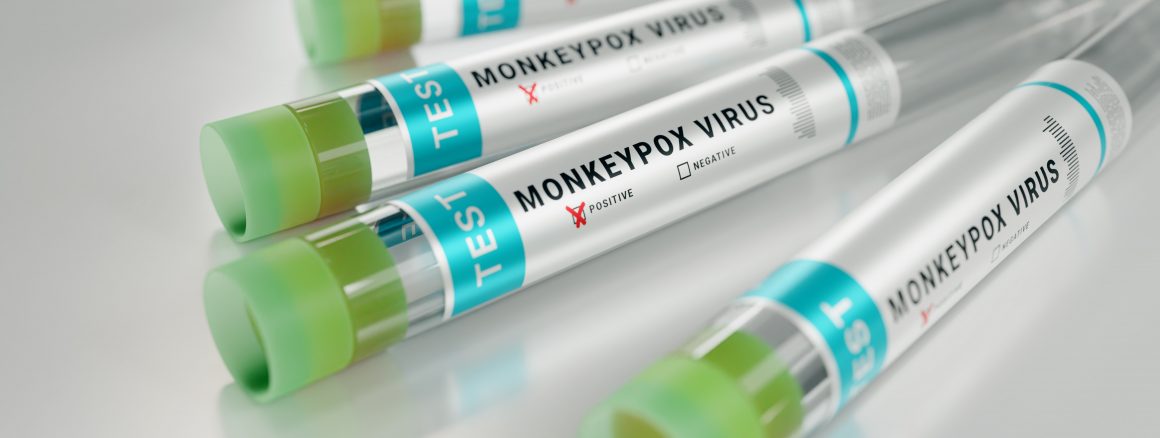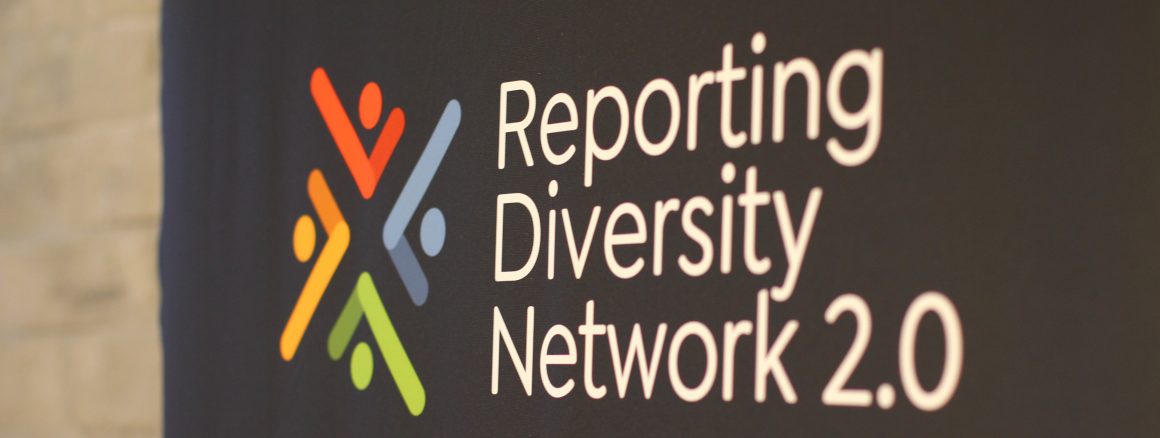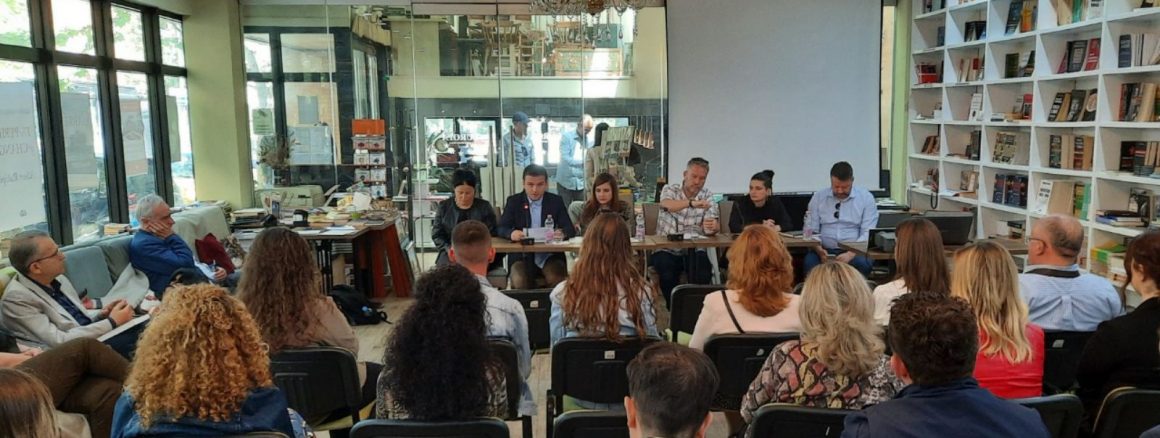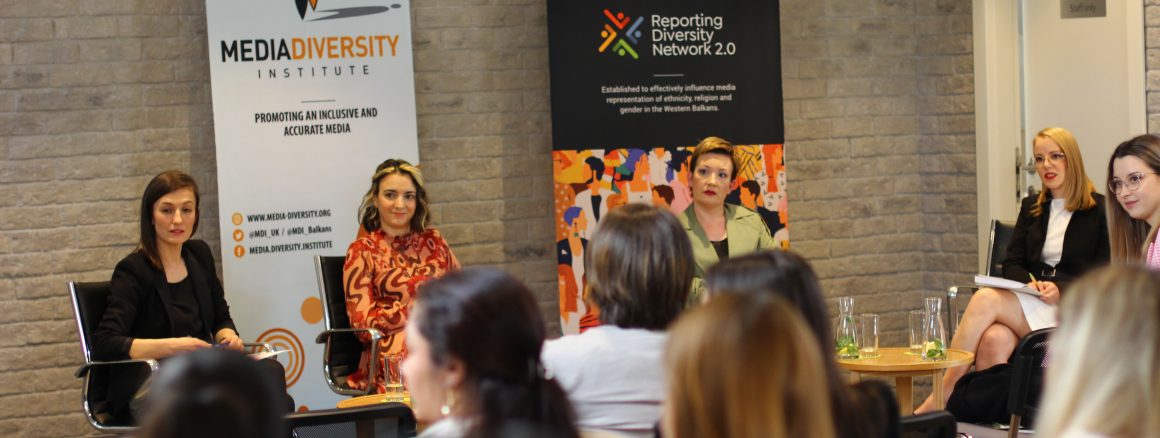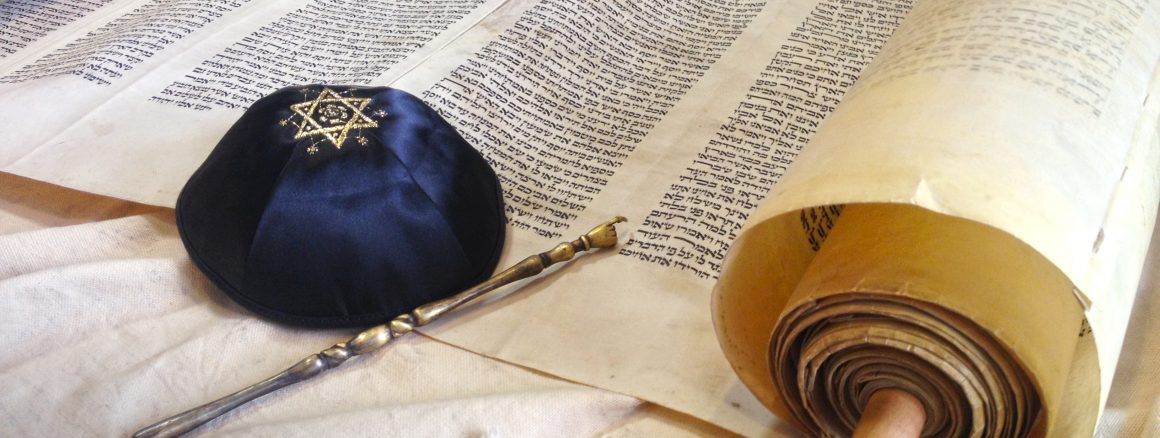Author: Ivana Jelača
Osuđuje se neprofesionalno izveštavanje medija o širenju majmunskih boginja i dovođenja u vezu sa LGBTQ+ populacijom
May 25, 2022
Poslednjih nedelja zabeleženo je više slučajeva infekcije majmunskim boginjama u Evropi, Sjedinjenim Američkim Državama, Australiji, Kanadi. Nakon što su otkriveni slučajevi infekcije kod gej, biseksualnih i drugih muškaraca koji imaju seks sa mušakrcima, mediji su počeli da izveštavaju o majmunskim boginjama kao bolesti koja se „prenosi gej seksom”.
Tabloid Kurir je u svom tekstu „MAJMUNSKE BOGINJE SE PRENOSE GEJ SEKSOM! Još ih zvanično nema u Srbiji, ALI AKO IH MUŽ IMA MOŽE DA PREKINE BRAK! (FOTO)” pored homofobije, izneo i niz neistina i dezinformacija.
Kurir se u tekstu poziva na informacije koje je objavila Svetska zdravstvena organizacija (SZO), i prenose „kako je najveći broj slučajeva zabeležen među muškarcima koji su imali seksualne odnose sa muškarcima!”. Međutim, izostavljaju informaciju da je savetnik za HIV, hepatitis i polno prenosive infekcije pri SZO Endi Sil naglasio da iako „vidimo neke slučajeve među muškarcima koji imaju seks sa muškarcima, ovo nije gej bolest” i dodao da „svako može dobiti majmunske boginje u bliskom kontaktu sa zaraženom osobom”.
Naslove i narative slične onim u Kuriru imali su i još neki mediji. U razgovoru sa virusologom i mikrobiologom Milankom Šekler, koristi ih i Radio Televizija Vojvodine (RTV). Javni servis umesto da jasno i blagovremeno informiše javnost o majmunskim boginjama, svojim tekstom „BEZ PANIKE: Od majmunskih boginja uglavnom oboleli homoseksualci” doprinosi stigmatizaciji, širenju straha i nepoverenja prema gej i biseksualnim muškarcima.
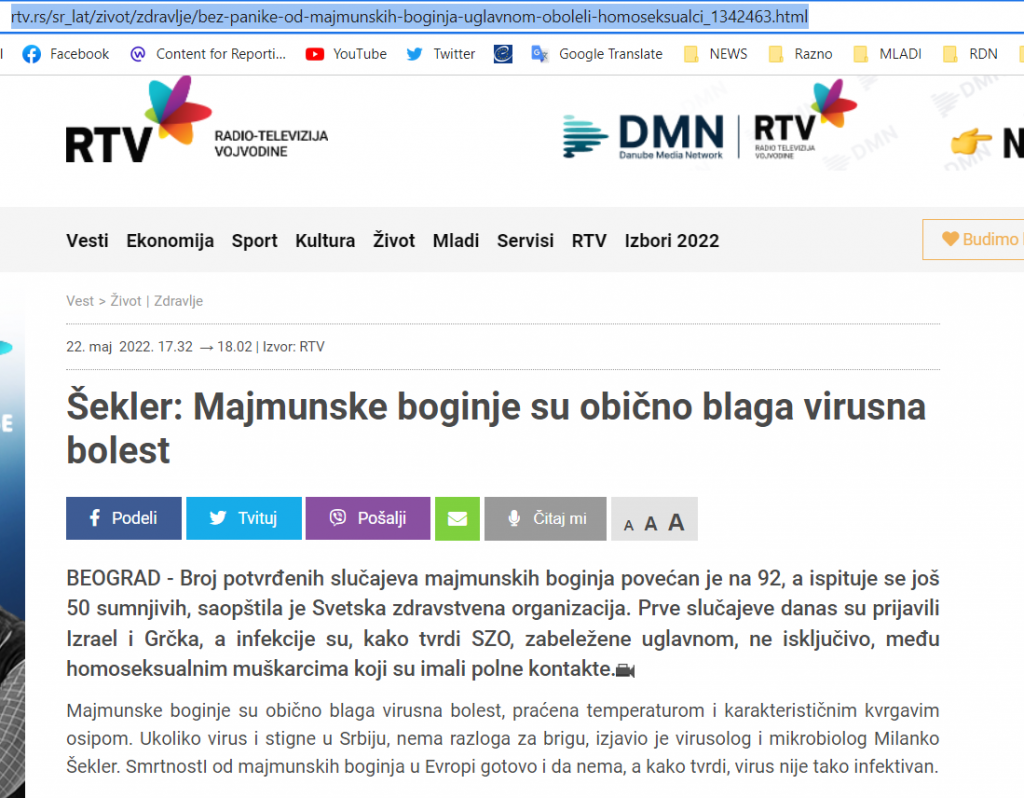
RTV je naknadno izmenio naslov, što govori o uočenoj grešci, ali tekst i dalje doprinosi stigmatizaciji LGBTQ+ zajednice umesto da objektivno informiše o bolesti u skladu sa javnim interesom.
Ujedinjene nacije su takođe skrenule pažnju na problem: „Stigma i krivica potkopavaju poverenje i sposobnost da se efikasno reaguje tokom epidemija poput ove“, rekao je Metju Kavana, zamenik izvršnog direktora UNAIDS-a. Ovim je naglašena šteta koju ovakvi narativi čine javnom zdravlju i celokupnom društvu.
Stigmatizacija i targetiranje pojedinih grupa ne samo da nanose štetu određenoj zajednici, nego remete i javno zdravlje. Mediji bi trebalo da pristupe ovoj temi kao zdravstvenom problemu, pružajući relevantne informacija od javnog interesa, bez širenja homofobije. Nasuprot, ovakvo izveštavanje medija veoma podseća na izveštavanje o HIV-u tokom 80-ih godina i predstavlja realnu opasnost od jačanja stigme prema LGBTQ+ zajednici.
Mediji bi trebalo da izveštavaju u skladu sa Etičkim kodeksom novinara Srbije, ali i da budu svesni svoje odgovornosti kada izveštavaju o osetljivim temama. Etički kodeks izričito kaže da „novinar mora biti svestan opasnosti od diskriminacije koju mogu da šire mediji i učiniće sve da izbegne diskriminaciju zasnovanu, između ostalog, na rasi, polu, starosti, seksualnoj orijentaciji, jeziku, veri, političkom i drugom mišljenju, nacionalnom ili društvenom poreklu”.
Pored toga, podsećamo medije na njihovu ulogu i odgovornost prema društvu, u ovom slučaju važno je zaštiti javno zdravlje i bezbednost građanja i građanki, a stigmatizacija jedne društvene grupe i stvaranje zablude o načinima prenošenja bolesti doprinose sasvim suprotnom efektu.
Ovo saopštenje zajednički potpisuju:
Institut za medije i različitosti – Zapadni Balkan
Nezavisno udruženje novinara Srbije
Beograd Prajd
Nacionalni centar za seksualno i reproduktivno zdravlje – POTENT
Udruženje Da se zna!
Asocijacija Duga
Labris – Organizacija za lezbejska i ljudska prava
Rainbow Ignite
Udruženje L* – Communio
ZOOMER.rs
Centar E8
Reflektor teatar
Talas
ERA – Equal Rights Association for Western Balkans and Turkey
Grupa “IZAĐI”
XY Spectrum
GLIC
Geten
Konsultacije za lezbejke
Sexism, ethnic hate speech and hate speech against the LGBTQ+ community present throughout the Western Balkan region
May 17, 2022
Sexism, misogyny and hate speech towards women and the LGBTQ+ community, as well as hate speech based on ethnicity, are most prevalent in Western Balkan media and something that is common to the whole region, according to the results of media monitoring in the Western Balkans which followed problematic trends in reporting on social diversity.
These results were presented at the regional conference ‘Where have diverse voices gone’ in Belgrade. Monitoring of hate speech and representation of diversity is conducted within the Reporting Diversity Network 2.0.
The findings were presented by media experts from the region: Kristina Lani (Albanian Media Institute), Leila Bičakčić (Center for Investigative Journalism), Violeta Oroshi Berishaj (Kosovo 2.0), Željana Kandić (Center for Investigative Journalism Montenegro), Bojan Georgievski (Institute for Communication Studies Skopje) and Ivana Jovanović (Media Diversity Institute Western Balkans).
Sexism, misogyny and hate speech towards women and the LGBTQ+ community, as well as hate speech based on ethnicity, is the most prevalent discourse in Western Balkan media according to the results of the media monitoring in the region which assesses problematic trends in reporting on social diversity.
These results were presented at the regional conference ‘Where have diverse voices gone’ in Belgrade, May 5, 2022. The monitoring of hate speech and representation of diversity is conducted within the Reporting Diversity Network 2.0.
The conference was opened by Milica Pešić, Executive Director of Media Diversity Institute, Tatjana Prijić, deputy Commissioner for the Protection of Equality in Serbia, and Victor Dragutan, Programme Manager at the European Commission’s Media and Civil Society unit, who all highlighted the importance of fair and balanced representation of social diversity in the media. While addressing the participants, Prijić highlighted the efforts that the office of the Commissioner for the Protection of Equality does in order to react to hate speech and ensure the equal treatment of all social groups in Serbian society.
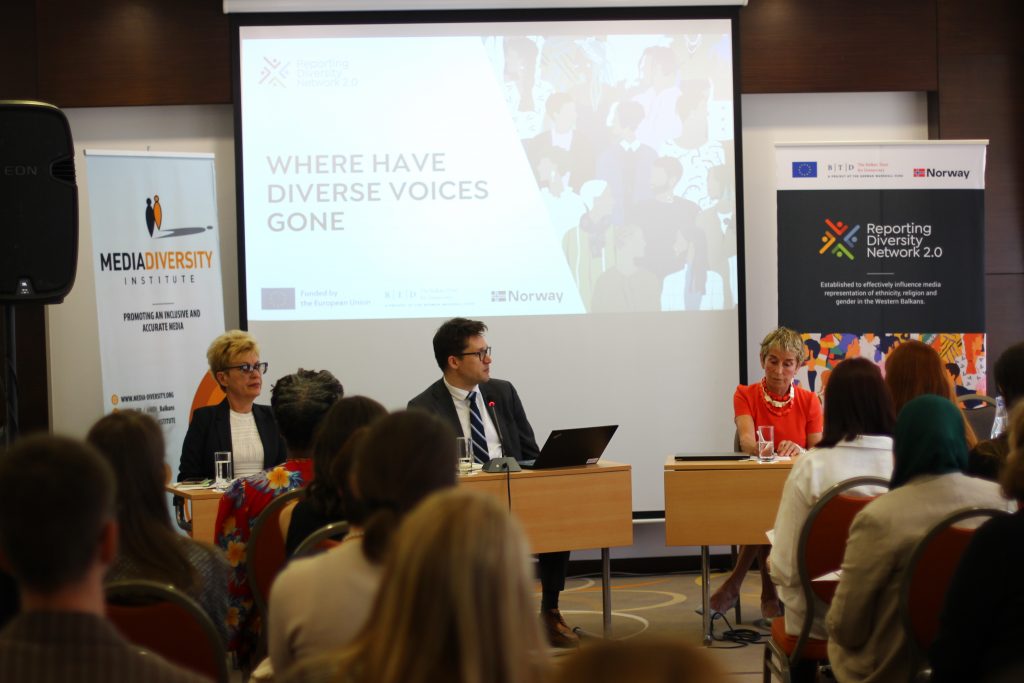
“European Union takes increasingly bold steps to support democracy and freedom of expression, that depends of course on media freedom, pluralism, independence and viability, as well as on the ability of journalists to do their job without fear. Diversity and making all voices heard, which is the topic of the conference today, is of utmost importance too”, said Dragutan after commenting on increased polarisation in media globally, the spread of the “Fox News model” of opinion media, disinformation circuits amplified by social media.
The RDN2.0 media monitoring findings were presented at the conference by media experts from the region: Kristina Lani (Albanian Media Institute), Leila Bičakčić (Center for Investigative Journalism), Violeta Oroshi Berishaj (Kosovo 2.0), Željana Kandić (Center for Investigative Journalism Montenegro), Bojan Georgievski (Institute for Communication Studies Skopje) and Ivana Jovanović (Media Diversity Institute Western Balkans).
“Hate speech along gender lines mainly presents itself in the form of victim blaming, perpetuation of the tradition that women should possess virtue, as well as objectification of women for entertainment” said Kristina Lani from the Albanian Media Institute.
Željana Kandić from the Center for Investigative Journalism Montenegro pointed out that in Montenegro, the most frequent targets of hate speech are women who are engaged in public affairs.
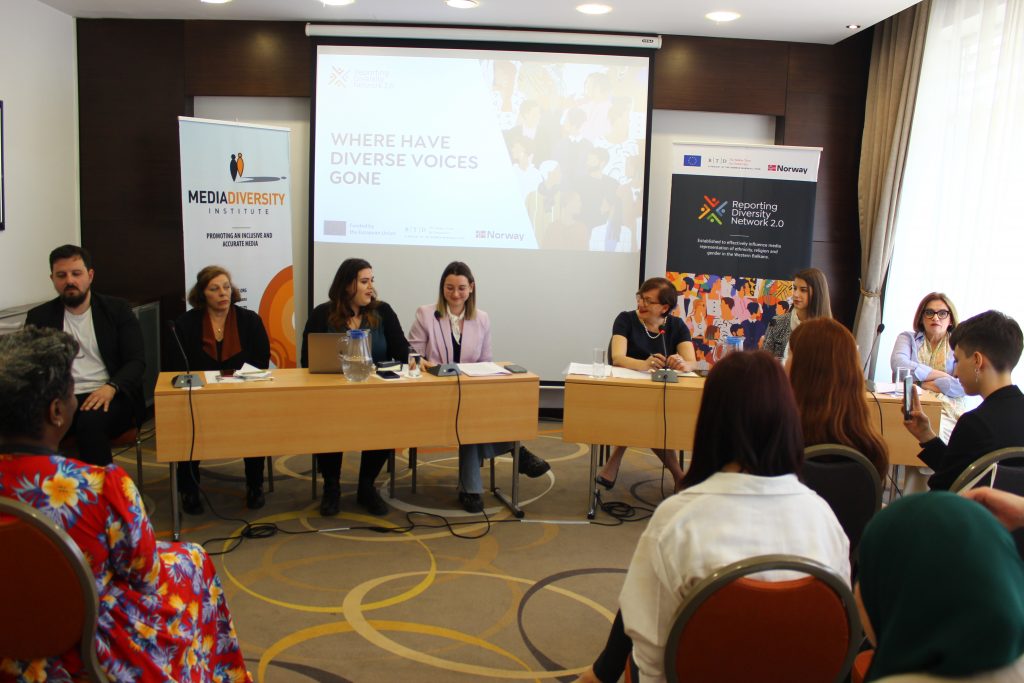
“Most often, women who are engaged in public affairs are targeted, i.e., politicians, journalists, representatives of the NGO sector. In the last few years various examples of misogyny have been noticed – from insulting comments, through to caricatures in which women are shown naked and in an inferior position, all the way to death threats” said Kandić.
Ivana Jovanović from Media Diversity Institute Western Balkans said that the situation is not any better in Serbia, and that the results show that women are the most exposed to hate speech and gave the example of the media with a national frequency that in 2021 participated in the secondary victimisation of women who reported rape allegations and sexual harassment allegations.
“Certain tabloids, as well as televisions with national frequencies, spread narratives that shift the blame to the victim who reported (sexual) violence, as well as conspiracy theories that rape and sexual harassment allegations ‘represent an attack on Serbia’ and thus they participate in the secondary victimisation of victims” said Jovanović.
The panellists said that the targets are those who challenge traditional values, such as women who are fighting for their emancipation or members of the LGBTQ+ community who do not fit the traditional norms.
Bojan Georgievski from the Institute for Communication Studies Skopje also pointed out the role of social networks when he spoke about the ‘Public Room’ case – the Facebook group within which men shared private pictures of women without their consent. Georgievski also noted that this case is in a way an example of good practice, because the administrators of the group were punished with imprisonment, but he also pointed out how this case pointed out the weaknesses of the system, as it took a year to process the case.
Ethnicity is also a sensitive category of social diversity and the results in all six countries can confirm this. The reporting on neighbouring countries is problematic, and there exists particularly sensitive topics such as the Serbia-Kosovo relations or the wars of the 1990s.
“When journalist Pero Jovović went to Pristina for the festival ‘Mirëdita, dobar dan!’ and posted it on his private Facebook profile, pro-government tabloids used it as to target him and his media outlet, which led to Jovović receiving death threats on social networks. A similar thing happened to activists as well as journalists who reported on the mural of convicted war criminal Ratko Mladić. From these examples we can see that the media are very often generators of hate speech” said Jovanović.
Violeta Oroshi Berishaj, who followed the media coverage in Kosovo, also pointed out the relations between Pristina and Belgrade as the initiators of negative trends in the media, which then spill over into social networks. She also spoke about how the media often do not use open hate speech, but the way they report influence public opinion, which is then manifested in an avalanche of hate speech on social networks.
Leila Bičakčić from the Center for Investigative Journalism (CIN) of Bosnia and Herzegovina pointed out that the media in the region are polarised and follow in the footsteps of politicians. The findings from the research confirm that politicians in the Western Balkans are often the initiators of rhetoric that encourages social divisions and hate speech.
What is also common to all Western Balkan societies is the absence of Roma from the media. Interestingly, the monitoring findings do not show many examples of hate speech against Roma. However, this is an indicator of an equally negative trend – Roma are reported only on the occasion to mark World Roma Day or in reports on crime and similar negative contexts. Conference participant, Kristina Lani, called this “hate silence”.
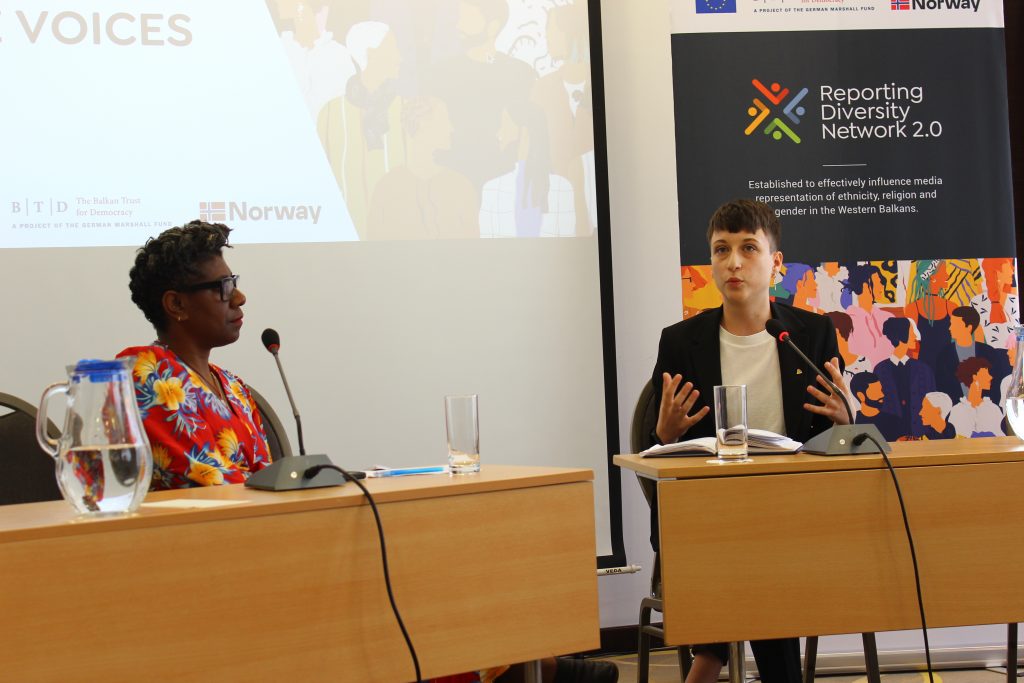
At the conference ‘Where have diverse voices gone’ media representation of diversity was further explored through several panels that dealt with the importance of creating counter-narratives, the thin line between freedom of speech and hate speech, the role of social networks in spreading hate speech, but also in fighting against it. Also, a panel with representatives of regulatory and self-regulatory bodies from the Western Balkans aimed to raise discussion about existing practices to combat hate speech and harmful practices in media representation of social diversity, as well as the cooperation of civil society with institutions.
Monthly monitoring highlight: Hate speech during April across Western Balkans
May 13, 2022
Throughout the month of April, the RDN monitoring team has detected a range of hateful narratives and discourse. This month there has been a rise in ethnic discrimination, sexism, and homophobia in the Western Balkan region.
Ethnic discrimination in North Macedonia, Serbia and Bosnia and Herzegovina
The now-former Secretary-general of the Government of North Macedonia, Muhamed Zeqiri, was arrested on suspicion of abuse of his official position of authority. Muhamed Zeqiri has been accused, alongside two Croatian citizens, for concluding a contract for public procurement of consulting services with a legal entity without conducting a public call for the procurement, thereby damaging the state budged by a total of 795,000 euros. He has now been imprisoned and is currently serving a 30-day detention.
Following his sentence, a Twitter user posted a picture of Zeqiri during his imprisonment, while taking a walk outside, with the caption “is there something more beautiful than an Albanian in prison?”
The public in North Macedonia is inclined towards believing that Albanian politicians are often spared from arrest and imprisonment despite law breaking, due to the political allegiances between the political figures and Albanian political parties. Thus, hateful and discriminatory narratives are often presented along ethnic lines as seen in this Twitter post. This comment on Twitter was motivated and rooted by a similar belief, further fuelling tension between the two ethnic communities.
In Serbia, the Instagram page Bunt Kosovo and Metohija is one which shares numerous pro-Russian posts including denying the crimes and acts of violence in Ukraine, labelling it as ‘Western propaganda’. Furthermore, they publicly deny the Srebrenica genocide, equating these – what they call – ‘fake crimes’ in Ukraine to the ‘made up genocide in Srebrenica’.
The post itself read “The Ministry of Defence in Ukraine published a disturbing video in which it informs that during the previous few weeks, civilians in Bucha were randomly killed, some with their hands tied behind their backs, and bodies were scattered on the city streets. They called Bucha ‘the new Srebrenica”. At the bottom of the post was written “Russia must win this war. Work, brothers, everything is fine at home!”.
This post is harmful and problematic for a number of reasons. The war in Ukraine is an extremely sensitive issue with many people falling victim to the conflict. Apart from spreading unverified claims, harm is done by labelling Srebrenica as a ‘fake crime’, undermining the Srebrenica victims and casualties in the 1990s. Posts such as these promote ethnic discrimination and divisions amongst the public, further opening the wounds of the conflict in the 90’s, which remains highly sensitive and polarising topic in the Balkan region.
In Bosnia and Herzegovina, the Twitter page ‘Samopoštovanje’ (samo_postovanje) tweeted a post which read “by forcing lies and half-truths, we will not reach reconciliation, but we will only sink deeper into mistrust, disbelief and even hatred”. The group Samopoštavanje is a group which comes from Prijedor, who present themselves as a group which wants to restore national and cultural self-esteem.
Despite the fact that the Hague Tribunal’s ruling has confirmed that the Prijedor Crisis Staff in 1992 had ordered both Bosniaks and Croats from the area to wear white stripes on their upper arms as a sign of their ethnicity, the Samopoštovanje group denies this. Attached to the twitter post is a YouTube video titled ‘A lie called a white stripe’.
By denying the events which took place during the war in the Balkans in the 90s, including the experiences of the victims of Prijedor war crimes, these statements actively spread misinformation and disinformation regarding historical events. These events have both been confirmed and ruled by the Hague Tribunal. By further denying and labelling these events as ‘half-truths and lies’, it is both insensitive to those who fell victims and those who lost loved ones in Prijedor, but also harmful for the reconciliation process and building peace in the region.
Homophobia in Kosovo
Following the election assembly, the Union of Kosovo Tarikats issued a joint statement in which amongst other things, it expressed a wish to cooperate with institutions; “the Union of Tarikats especially wants to work together with institutions in Kosovo in building a society without prejudice, which we know as racism, ethnic hatred, misogyny and Islamophobia, Sufi-phobia, and other exclusive forms that undermine trust and understanding in society”. As a result of this statement, several influential online media such as “Gazeta Express” and “Insajderi” claimed in their headlines regarding this news, that this religious community advocates same-sex marriage. The headline reads: “The first religious community to support same-sex marriage”. This inaccurate headline, also published on their Facebook page, provoked mostly negative comments in which various individuals used hate speech aimed at the Union of Kosovo Tarikats and the LGBTQ+ community. The Secretary of the Union, Sheh Lulzim Shehu told several media outlets that same-sex marriages are decided by the state, and that this issue should be resolved by law, but that they are against homophobia.
The Union of Kosovo Tarikats has around 250,000 believers, and the general public considers the dervishes members of the Islamic religion. However, the Union has refused to be part of the Islamic community of Kosovo. Unlike the three largest religious communities in Kosovo (Islamic, Catholic and Orthodox) which openly oppose same-sex marriage and the LGBTQ+ community in general, believing them to be dangerous to the future of mankind, the Union of Kosovo Tarikats have very different, more liberal ideas and attitudes on these topics.
This case is an example of the news fully taken out of its original context, resultingd in hate speech and narratives targeting various communities and individuals. The media has a duty to report factually and accurately, especially when the news has an effect on marginalised groups in society.
Sexism in Albania and Montenegro
In the feature by Top Channel on the rising number of divorces in Albania, divorce lawyer Vjollca Pustina argued that women are becoming initiators of divorces in most cases as “they can no longer stand being violated by their spouses”. The economic independence of women was also listed as another factor and contributor to the rising divorce rates. The headline read “Why is the number of divorces increasing? The lawyer: women can no longer stand violence”.
The framing of the statement, as well as the headline provided by Top Channel, are prime examples of victim blaming. Divorce is seen as a social problem, and in Albania is often still seen by many as ‘scandalous’. However, the real social problem lies in the gendered abuse and violence, which should be considered as a much more serious issue than simply a factor in divorce rates. Such headlines and statements divert attention from the true, root cause of the issue. Many women are victims of domestic violence and abuse, and so offering a platform to narratives suggesting it is simply a factor in divorce rates rather than an issue of concern in itself is a problematic approach to the topic.
In Montenegro, the MP of the opposition Democratic Party of Socialists, Dragica Sekulić, was a victim of brutal insults as a result of a Twitter post where she criticised the measures of the Minister of Economic Development Jakov Milatović, who suggested that every new-born in a municipality with negative natural growth should receive one thousand euros and with positive natural growth, 500 euros. At that time, Milatović held a meeting with the Metropolitan of the Serbian Orthodox Church in Montenegro, Joanikije.
Sekulić stated on Twitter that “if you choose to give birth in a certain municipality, you will receive 500 or 1,000 euros, with the blessing of the priest. Is it worth it?” in reference to that meeting. Following her post, Sekulić was attacked with vulgar insults on the basis of her gender on the Facebook page of the portal I Love Podgorica, which published her tweet. Nearly 400 comments, dominated by hate speech, are still on the site.
The attacks on Sekulić were condemned by almost all of the opposition parties, as well as non-governmental organisations and members of the Montenegrin parliament, with appeals to the authorities to react urgently.
This case has an interesting follow up, as MP Sekulić has announced lawsuits against authors of 381 online comments as well as the portal I Love Podgorica because they did not remove the comments fast enoughThis could set a precedentin the sense of extending the editorial responsibility on social media.
This case sparked debates about free speech, which is a continuous struggle for the legal system as well as other institutions charged withits supervision. In addition, there is discussion about the privileged position of public figures compared to private individuals, who would rarely be able to initiate such legal response.
TROLL OF THE MONTH: Duda Balje, the President of the Social Democratic Union and Member of the Assembly of Kosovo
May 6, 2022
The Balkan Troll of the Month is an individual, a group of individuals or a media outlet that spreads hate on the internet based on gender, ethnicity, religion, or other diversity categories. The Balkan Troll is selected based on hate speech incidents identified across the Western Balkans region.
April Troll is Duda Balje, the President of the Social Democratic Union and Member of the Assembly of Kosovo, who spread hate speech directed at an individual contributing to a surge of hateful attacks and violent threats against the individual and her family.
Recently, the director of the Nexhmedin Nixha Technical High School in Gjakova/Đakovica, Florentina Gjergjaj, was forced to resign from her position due to a wave of hateful and personal attacks towards herself and her family.
It all started following the revelation of a set of school rules which included a headscarf ban on wearing a headscarf alongside other bans including carrying weapons, wearing make-up, and more. The headscarf ban led to an outcry and backlash towards Gjergjai as this ban is thought to be her decision. As a result, Florentina Gjergjaj was asked to step down from her role as director of the technical school at the insistence of Gjakova/Đakovica County Educational Director Eranda Kumnova.
Following the revelation of the situation and of the ban itself which spread amongst the public, Gjergjaj received an overwhelming number of personal attacks on various social media. The comments and attacks were directed personally at her and her family and included, among other things, threats of burning down her house. As a result of these attacks, she and her family were forced to move away, and they are even considering leaving Kosovo.
Florentina Gjergjaj reported the hateful comments and threats she was receiving to the police which, in her opinion, stem from the reaction of MP Duda Balje, who publicly addressed and called out Gjergjaj to answer regarding the school’s ban.
Balje, among other things, wrote on her Facebook profile “Director of the Secondary Technical School ‘Nexhmedin Nixha’, in Gjakova/Đakovica, Mrs. Florentina Gjergjaj, on the basis of which Constitution or law did you set the symbols of prohibition?! I agree with some of them, but the symbol of the girl with the headscarf and comparing symbols in this way is scandalous and an insult to every citizen and our Republic, not excluding religious beliefs”.
This was seen as an instigation to the stream of hate speech and threats that Gjergjaj and her family received.
Most threats and comments that Florentina Gjergjaj received were based on religious grounds. In the context and period of Ramadan or Eid, the media and headlines focused on a variety of topics including that of the permission of individuals to wear headscarves in primary and secondary schools. The President of the Islamic Community of Kosovo, Mufti Naim Ternava stated that he believed the case at the Technical High School to be an omission as in no case can a headscarf be equated with a weapon or alcohol and other negative things.
That headscarf ban was probably imposed at an earlier stage, but was rather used at this timing to initiate a public conversation on the topic itself.
There is an Instruction by the Ministry of Education which does not allow underage girls to wear headscarves in schools. Indeed, following this case, the ‘Kosovo’s Islamic Community Council has requested from ‘the Ministry of Education, Science, Technology and Innovation, to remove the ban of wearing religious symbols in high schools’.
In addition, it is believed that the fact that Gjergjaj is a Christian Catholic adds another layer to this story as her religion have been misused in some comments directed at her.
Almost every media in Kosovo covered this case and incident at the Technical High School in Gjakova/Đakovica, reporting primarily in a professional and correct manner. However, there were also a number of comments on social media networks which insulted and demanded punishment for Florentina Gjergjaj whilst others defended her, reminding the public that Kosovo is a secular state.
This incident is one surrounding the important topic of religious freedom and individual rights in Kosovo. As a result of the direct targeting by MP Duda Balje and other social media users, both Florentina Gjergjaj and her family were forced to move away from their home and are even considering moving out of the country altogether. Both her and her family have fallen victims to hate speech and violent threats as a result of social media trolls and comments.
Reflecting diversity in the media: why and how?
May 5, 2022
The importance of reflecting diversity in the media
On April 28th 2022, the Albanian Media Institute organized the conference: “Reflecting diversity in the media: why and how?”.
The conference took place as part of the activities of the Reporting Diversity Network 2.0 Project, which has been implemented since 2020 in Albania, Kosovo, North Macedonia, Serbia, Montenegro, and Bosnia and Herzegovina. The project aims to replace divisive narratives and hate speech mainly of ethnic, gender and religious backgrounds, thus contributing to the promotion of the values of coexistence, tolerance and good neighborliness in the region.
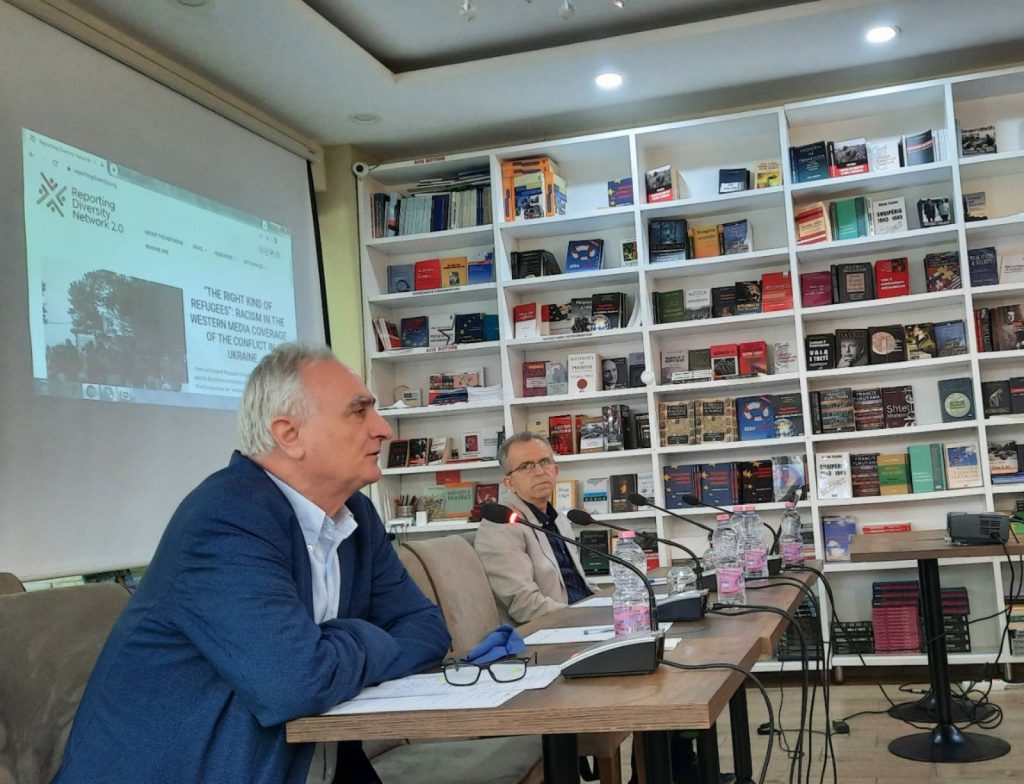
Reporting Diversity Network 2.0 is a continuation of the network established in 1997, at which time the First Reporting Diversity Manual was drafted and the Media Diversity Institute was established in London. The purpose of the Network is to promote accurate reporting and dignified representation in the media of diversity with racial, ethnic, gender, religious, and other, backgrounds.
The Albanian Media Institute (ISHM), as part of the Network, strives to improve the reporting of diversity in the media by pursuing a proactive approach, which means creating space for society, as it really is and looks like, to be reflected in the media. Thus, ISHM does so by embracing the fact that we are all different, we have different beliefs and opinions, different ethnicities, but we have a common right, which is to present ourselves with dignity, professionalism and accuracy in the media. As Remzi Lani, director of the Albanian Media Institute, emphasizes, “Albania needs reporting on diversity in society more than reporting on minorities, because the media has a duty to reflect the diverse world as it is, with ethnicity, religious beliefs, gender orientations, etc.”
This proactive approach was also reflected in the conference, which invited representatives of the Audiovisual Media Authority, the Commissioner for Protection from Discrimination, the Committee of National Minorities, the Center for Interfaith Cooperation, academia, civil society organizations covering target groups such as women in the media, women in science, children, people with disabilities, the LGBTQ+ community, etc. Journalists, students, teachers and representatives of youth and media organizations were also present.
The current situation of the reflection of diversity in the media
Despite the different institutions and target groups that the guests represented, they have one common concern: the misreporting of diversity in the media, which often includes hate speech, bias, offensive language, sensationalist language, derogative language, and sexism or misogyny. Prof. Rrapo Zguri stressed that “even in the mass media in Albania, animosities based on erroneous generalizations are present in the portrayal or reflection of the other or of the one who is different.”
Furthermore, other issues identified in the reporting of diversity in the media are “prejudices as a strategic form of self-reliance,” which appear in the phase of aggressive awakening and that of “dormancy.” The presence of the discourse of the majority or the “syntax of hegemony” leads to the denial of the rights of the ‘minority’ to be heard and represented in media and society. Other problematic lines of media discourse are related to religious or ethnic origin, rhetoric of ethnic, religious or regional superiority, collective instead of individual portrayal, euphemistic and ableist language, etc.
Suela Lala, from “Fondacioni Së Bashku” (Together Foundation) shared cases of inappropriate reporting on people with disabilities in the media, such as through the use of euphemisms as “differently abled,” or “special needs,” or denigrating terms such as “blind” or “deaf.” On the other hand, stories that present them at the dramatic extreme, with compassionate language or that which attributes supertalents, according to her, do not reflect reality, but stigmatize this target group and do not represent it as it really is.
Suela Musta from “Albanian Women in Audiovisual” shared the findings of the study conducted during the period May-June 2021, on women and girls in the media, who continue to remain underrepresented and misrepresented. The use of sexist language prevails, gender stereotypes are reinforced and women and girls who are victims of domestic violence or sexual abuse are blamed, while perpetrators and aggressors are justified. A sensationalistic approach and disrespect for the right to privacy also remain extremely problematic.
Reporting on religious topics also remains problematic, where, according to Sokol Lulgjuraj, from the Center for Interfaith Cooperation, the media reports in a biased manner and messages are distorted or used out of the context where they are stated. The rush to bring the latest news prompts immediate reporting and increases the risk of inaccurate reporting, non-verification of information or statements. Media outlets turn out to be selective and not inclusive in reporting on religious activities, which, according to him, occurs because “the media has no economic interest” in presenting a peace gathering of believers of all faiths.
Sead Kazanxhiu, from the Committee of National Minorities, stated that the media reports “in an exotic, prejudicial and discriminatory manner” on topics related to national minorities. He stresses that the media and journalists need to be more in-depth and professional when reporting on minorities. When it comes to reporting on minorities, “hate silence” is present, indicating a lack of reporting or representation of these groups in the media. Negligence and forgetfulness are just as harmful as misreporting.
On the other hand, Xheni Karaj, from the LGBT Alliance raised concerns about inappropriate media reporting on topics that affect the LGBTQ+ community, where it is observed that statements are taken out of context, headlines are sensationalistic in nature and television moderators and hosts are not professional and impartial during programming. All this lack of professionalism affects the spread of hate speech against the community and its particular individuals, the consequences of which can also be physical attacks or persecution in real life. “Reporting for clicks, or just a headline for a journalist in the newsroom, can turn into a nightmare in a person’s real life,” she added.
The current situation of diversity reporting in the media is obviously problematic, for all social categories without distinction. Unprofessional and unethical reporting, especially when it contains hate speech, insults, contempt and bias reinforces negative and harmful stereotypes about the “other”, whoever he/she is, creates social divisions and incites violence, which can then lead to discrimination or hate crimes.
Suggestions for improving diversity reporting in the media
In addition to sharing the current situation, the purpose of the conference was for guests to provide suggestions for improving the reporting of diversity in the media. Thus, Arben Muka, from the Audiovisual Media Authority, stressed that, in addition to reviewing complaints and content, an effective approach is to promote information and awareness on proper diversity reporting, as well as to encourage self-regulatory engagement. The fine against media service providers, as a punitive measure provided by law, does not always give the expected result, as the same violation may occur again by the same subject. In this case, education rather than punishment seems to be the most promising approach, although what this education/literacy involves and how it is enforced concretely in cases of violations of the code of ethics of journalism, remains to be clarified.
On the other hand, Robert Gajda, Commissioner for Protection from Discrimination, stressed that a good practice of improving the reporting of diversity in the media is the “immediate response” right after an incident or a misreporting has occurred. According to him, a timely reaction provides an opportunity to correct the news without going viral and without causing “greater harm,” as well as due to the fact that it is more effective in real time.
Regarding the representation of women and girls in the media, Blerjana Bino from the Center “Science and Innovation for Development” (SCI-DEV) & Network of Albanian Women in STEM, emphasizes that the presence of women in STEM in the media should be increased and a proactive approach should be followed to the identification and provision of media space. Education/literacy and awareness, as well as monitoring and responses remain active forms of improving media reporting of women and girls. Suela Musta, meanwhile, emphasizes that the new Broadcasting Code should pay special attention to sexism and misogyny in audiovisual media, with the aim of reducing them as much as possible.
Suela Lala says that improving reporting on people with physical, sensory and mental disabilities can be improved by avoiding the use of euphemisms, reporting in a balanced, non-sensationalistic way, as well as by reporting from a human rights approach rather than from a defensive approach that presents them as categories to be pitied.
In conclusion, other practices for improving media diversity reporting are immediate social and media responses, through reporting or public statements; taking stronger measures against national televisions which use television space to reinforce negative stereotypes, sexism, misogyny or denigrating language towards different social groups; large-scale media literacy for all age groups, as well as reports and complaints to the “Complaints Council” or the “Alliance for Ethical Media.”
Who asked her for her opinion – women in the media in Serbia
April 20, 2022
Although they make up half of the population, women as subjects and sources of news are in only a quarter of the world’s media content, according to the latest results of the Global Media Monitoring Project. The situation in Serbian media is below the world average, because women appear as interlocutors in a fifth of the content. Serbia has been participating in this research since 1995, and current results show no major progress since then.
Whether the statistics reflect the situation on the ground, how are women reflected in the media, in which areas we witness positive progress and what are the solutions for improving the image of women in the media in Serbia, was discussed on Thursday, April 14th, in Belgrade at the conference ‘Who asked her for her opinion – women in the media in Serbia’.
The changes do exist, but that they are very slow, concluded Ivana Jovanović (Media Diversity Institute Western Balkans), Danka Ninković-Slavnić, (Fakultet političkih nauka/Faculty of Political Science, University of Belgrade) i Ivana Kahrmann, consultant for media development and civil society, who shared their experiences at the first panel. The speakers agreed that women are mostly interlocutors on the topics of everyday experiences, they rarely speak form an expert position, they are more visible in the field of culture, entertainment, fashion, health, rather than, for example, politics, economic and security.
The feminisation of the profession has led to more female journalists working in the media than male journalists, but, paradoxically, they are not found in large numbers within editorial and decision-making positions, except at the local level.
Where there is less money, there are more women, because men leave those positions – Ivana Kahrmann explained this phenomenon and presented data from Association Local Press research on the position of the media in the local context. Of the 56 media workers from 28 cities in Serbia, 21 are media owners or directors, and some of them are also editors, not because they necessarily want to be, but because they do not have enough resources. They usually establish their own media, because they will not tolerate pressure or mobbing. The research of Local Press also showed that the most endangered category of all media workers and journalists are female journalists, who face the greatest pressure – from not being invited to events, through both verbal acts and violence in the digital space, as well as sexism.
On the other hand, when it comes to media content, of all the discriminatory topics, misogyny and sexism are the most common, and this is common across all countries in the region, according to the results of media monitoring conducted by the conference organiser – Media Diversity Institute Western Balkans – revealed. All the countries in the region are rooted in deep patriarchy, and that is reflected in the media, adds Ivana Jovanović, who conducts media monitoring in Serbia within the Reporting Diversity Network 2.0.
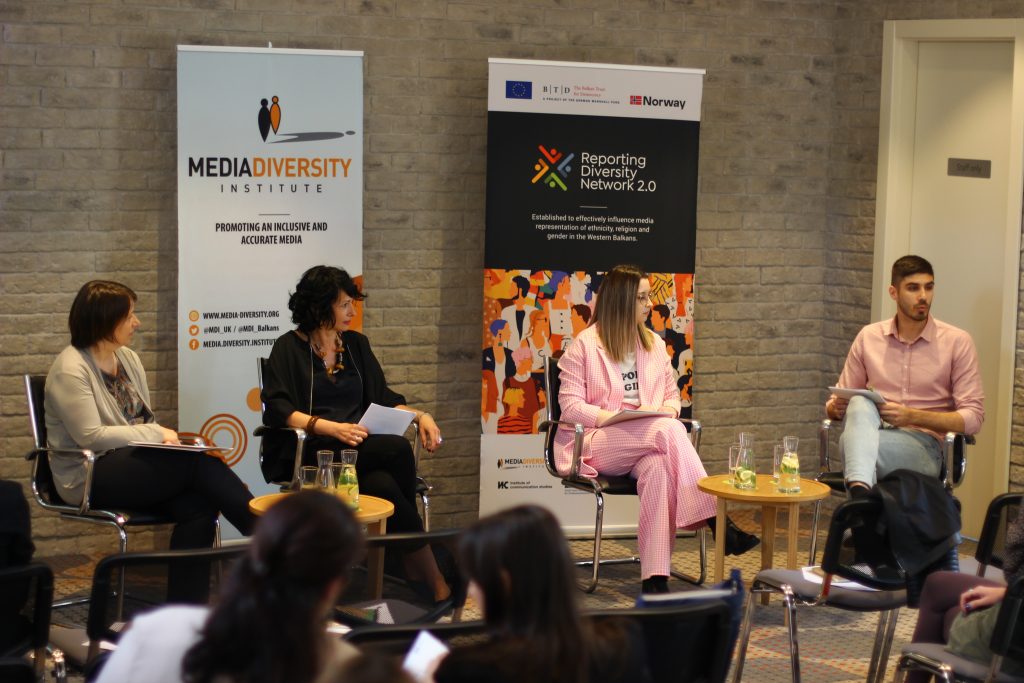
The media do not approach the topic of violence against women as a social problem, but stick to sensationalist reporting – said Jovanović and added that reporting on femicide is deeply problematic, because within the content on this topic you can read everything from secondary victimisation to conspiracy theories.
On a more positive note, the analysis of the group of Journalists Against Violence Against Women (Novinarke protiv nasilja prema ženama) showed that reporting on violence against women is better than it used to be.
In the past three years, 36,000 media publications have been reviewed, and according to all indicators, reporting on violence against women has improved, but the problem is still big – said Jovana Gligorijević (Journalists Against Violence Against Women) and added that she has hope for the young generation because they are young and more willing to be sensitive, as they are living in that which the older generation report on.
Minja Bogavac, agreed with her when presenting an example of good practice – the youth portal ZOOMER.
At the conference Who asked her for her opinion – women in the media in Serbia, the author of the series Ona se budi (She Wakes Up), Mia Bjelogrlić, also spoke about how the idea behind the series was to position the topic of gender equality within the mainstream arena.
– It is now the turn for women to tell the story form their point of view, how they see their position in society, and not for men to talk about it instead of them – said Bjelogrlić and added that there is no single answer to the question of how to unravel the patriarchy, but that she sees the solution to be one of a parallel process, both in the institutional and in the private sphere.
– There is an implied consensus in society as to how a women should live and behave, and changing that requires additional engagement, regardless of laws and quotas, because if the institutional framework does not reflect on everyday life, then there is a gap in which we live – explained the author of the series Ona se budi (She Wakes Up) and added that that is why proactive activism of various kinds is important.
One such solution is the Feminist Media Declaration presented by Jovana Netković (Feministički kulturni centar Befem/Feminist Cultural Center Befem). This document is the result of the continuous work of media experts and is another tool in the fight towards more gender-sensitive media reporting.
In addition, Befem created the Equality Bureau (biro jednakosti), where 19 lists are available to the media wither over 385 women experts in various fields and which integrated the gender perspective in the fields of education, security, sports, culture, economy, mental health etc.
The participants in the gathering agreed that the media is a powerful tool for socialisation, and that is why it is of importance how various identities are presented through them and how topics are discussed. As potential solution to changing the media image, the speakers also mentioned the tools created by the group Journalists Against Violence Against Women. Namely, there is a database of photographs and illustrations that responsibly and ethnically depict the problem of violence, forms and reactions to violence, and /or are aimed at strengthening and showing solidarity with those exposed to violence.
Media Diversity Institute, in addition to monitoring and analysing media content, offers as a solution to this issue – the creation of alternative and counter-narratives in order to contribute to the diversity of images of women in the media.
All speakers at the conference agreed that examples of good practice should always be highlighted, especially supporting female journalists who bring stories in a professional and sensible way, and recommended that colleagues and media workers always consult with those with whom the report refers to as to how they wish to be represented.
The Minister for Human and Minority Rights and Social Dialogue, Gordana Čomić, Deputy Commissioner for the Protection of Equality, Tatjana Prijić, Special Advisor to the Deputy Prime Minister and Minister of Culture and Information, Gordana Predić and representative of the Press Council, Jelka Jovanović, spoke about the protection mechanisms and the institutional framework for improving the image of women in the media, as well as the position of workers in the media.
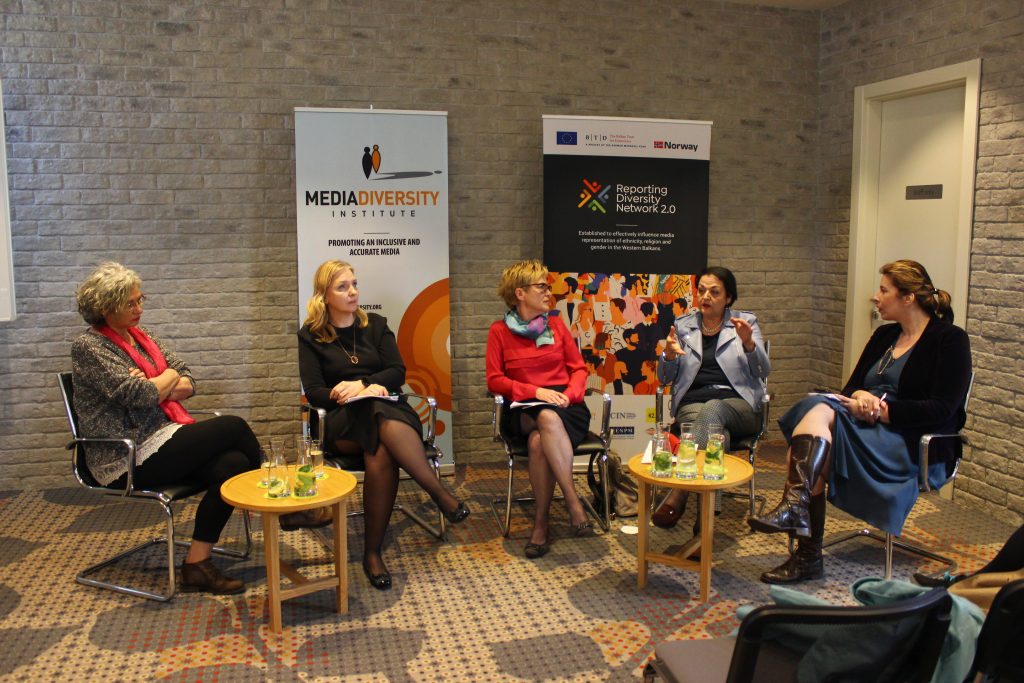
Gordana Čomić stated that all acquired rights must be defended, and explained that the introduction of obligatory quotas for women in decision-making positions is reformative work that cuts into all layers of society.
This is a beginning that must be defended, because first you have to fight for your rights to be written down, then to be turned into action, and then you have to fight so that someone doesn’t bring you back, and only then to improve those papers – said Čomić, adding that you cannot ban prejudice, but you can ban behaviour based on prejudice.
Tatjana Prijić confirmed that stereotypes and prejudices are a big problem and added that one of the solutions to this is to start by not doing to others what we do not want to be done to us, and not just because the commissioner or the law will tell us not to.
The gathering was concluded with the words of Jelka Jovanović who said that the media is a mirror of society, but often also a generator of ideas or initiators of topics, and that only a small number of media raise the issue of the position of women, and therefore, men in society.
RELIGIOUS TOLERANCE IN MACEDONIA: A familiar but rarely practiced concept
April 13, 2022
* Views and opinions represented in this blog are personal and belong solely to the author of the blog and do not represent those of Reporting Diversity Network 2.0 nor Media Diversity Institute unless explicitly stated.
Religious tolerance is built by getting to know others, a clarification that their diversity is not a threat to us or our religious beliefs.
A few weeks ago, the Macedonian public was informed of the arrival of the Jewish religious group Lev Tahor (Open Heart) in Kumanovo. This group that is traveling through Macedonia would not have caused a reaction among the local population, nor in the public, if it were not for two moments.
First, the very controversy of this religious group, which is characterized as a “sect” that practices Judaism in a fundamentalist form, and second, the violent reactions of the people towards them.
Bad reputation has been following this group for some time. The accusations and the prison sentences handed down to their leaders for forced underage marriages, child molestation, and child abduction have reached the Macedonian citizens as well. However, the violence and intolerance of our fellow citizens towards this religious group was something that was totally unnecessary.
According to Macedonian law, they have a maximum stay of three months in Macedonia and that stay was approved by our institutions because they said that they are only traveling through the country without intention to stay longer than the period that is legally allowed. They were in Sarajevo, in the Ilidza neighborhood, where they were also not accepted. Religious intolerance is somehow deeply rooted in the people of the Balkans, although we like to brag that we are hospitable and open-hearted people.
On the other hand, this religious group has predominantly consisted of children and some adults (18 children and 19 adults). In their statements in front of the television cameras, they clearly stated that they do not intend to stay in the country and are looking for a country that will accept them and where they can freely practice their religion.
Who are Lev Tahor?
This religious group was established in the late 1980s, practicing Judaism in a fundamental way, compared to Judaism practiced in Israel. Judaism is practiced in Israel by 4 religious groups: Haredi (ultra-orthodox), Dati (religious), Masorti (traditional), and Hiloni (secular). The differences between these religious groups are not only in the belief in the existence of God (40% of secular Hiloni do not believe in the existence of God) but also in the political views.
The ultra-orthodox Haredi do not even serve in the military, while the Dati group is more inclined to Zionism and believes that the Arabs should be expelled from Israel. Lev Tahor, judging by the dressing, inclines towards ultra-orthodox Jews, especially in the clothing of men, while women are a-typically dressed completely in black, which also applies to female children.
However, their practice of religion is more extreme than that of ultra-orthodox Jews, their prayers are loud and long, and they have a limited diet imposed by their founder, Shlomo Helbran (they do not eat chicken because they believe the chicken is genetically modified and is not the same as the one created by God).
Their leader and founder Helbran was persecuted in the United States (where he founded the sect) for kidnapping a child, preaching the destruction of Israel, citing alleged Bible texts and was suspected of collaborating with Islamic fundamentalist groups.
With the persecution of their leader, they moved to Guatemala as a religious sect, and later came to the Balkans. Their difference in practicing Judaism can also be seen in the fact that during their stay in Macedonia, they were not contacted by the Macedonian Jewish community.
And what about our intolerance?
By definition, religious tolerance is the acceptance of the religious differences of another religious group and respect for their religious beliefs in all areas of society. This religious group has not experienced that from our fellow citizens in Macedonia. On the contrary, the videos showed the reactions of our fellow citizens who were quite aggressive and with unjustified fear, and they proved once again that our religious patience and tolerance are at a low level.
On the one hand, the fear of the citizens of this group is understandable due to the information that is spread about them, especially of the fellow citizens from the Ohrid village of Gorno Lakocherej where this group moved to after Kumanovo. But on the other hand, the facts are not known.
They are in North Macedonia legally, under police surveillance, they do not preach their beliefs, they are not violent, and they are calm and quiet. The statement of one of the members of this group in front of the camera was that it is difficult for them to travel with their children, let alone to kidnap other people’s children, should have a slightly sobering effect on the citizens.
Religious intolerance is also based on ignorance of other religious groups and their characteristics. How much do people in North Macedonia know about Islam and their neighbors? A little more than they know about Judaism, but only because they have Muslim neighbors. How much do we know about Hinduism or Buddhism?
People only know about other religions if they have shown interest in reading and getting to know other religions, and such a practice is not very common among Macedonian citizens. In their primary education they have teaching subjects of Ethics of Religions and Introduction to Religions that are taught in sixth grade. But in this case, the children were not the ones who expressed intolerance and aggression towards another religious group – it was the adults.
Lack of knowledge of other religions and lack of desire to find out more about them, at least the basics, creates fear and impatience. On the one hand, the fear of citizens due to the controversy of this group is understandable, but violence is not the answer, especially if the group does not violate any law, nor endanger someone’s life.
The religious intolerance in Macedonia is eradicated by education and learning about religions not only in the education system but also through institutions (police, religious institutions). Macedonians have a practice of acquiring their education through dubious and obscure articles found on the Internet and social media that are fertile ground for the spread of hatred and violence.
They have not made progress in the religious tolerance within the society with the first neighbors belonging to other religions, much less can we understand other religions with which we had no contact. That fact was further confirmed by the case of Lev Tahor.
Religious tolerance is established by getting to know others, explaining that others and their diversity are not a threat to us or to our religious beliefs. Religious leaders also play an important role in this type of education of our citizens because they are the first to point out the diversity that exists and the tolerance that they preach, if their followers do not practice that.
Religious tolerance should also be focused on atheists and agnostics. As long as we are religiously locked in our folds and do not open up ourselves to something new, and based on that ignorance we build fears and show out aggression, we will have cases like Lev Tahor.
The first step is to acknowledge that we are religiously intolerant, and the steps to address that situation are well known – education, discussions, getting to know new things.
Author: Sonja Stojadinovic
Photo: Oleg Ivanov IL/ Shutterstock
SEXISM, ETHNIC DISCRIMINATION AND HOMOPHOBIA IN THE WESTERN BALKANS: March monitoring highlights
April 12, 2022
Throughout the month of March, the RDN monitoring team has detected a range of hateful narratives and discourse. Cases of ethnic discrimination, religious hate speech and homophobia continue to influence the relations within societies in the Western Balkan region as well as the relations between neighbouring countries.
Sexism in Bosnia and Herzegovina and Serbia
In early March, the canton of Sarajevo Government decided to instigate the fight against menstrual poverty by providing free pads for female students.
Nevertheless, despite menstrual poverty being an extremely important and pressing issue, this decision was not approved or supported by the representatives of the national parties. Namely, the MP of the largest Bosniak party, Salko Zildžić, turned to ridiculing and mocking the decision altogether. He went on to sarcastically comment on the decision during a parliamentary session, saying: “The prime minister of the most potent canton with a budget of one billion and more is dealing with menstrual poverty”.
Menstrual poverty is a serious topic and issue which affects women and girls worldwide. Despite various efforts to combat the issue of menstrual poverty, having a member of parliament express negative and sarcastic comments regarding the topic merely pushes aside the need to confront and effectively deal with the issue at present. Having such sarcastic comments being made in parliament, which is both streamed live on traditional media such as the television and other social media platforms such as Facebook, further spreads and reproduces these negative attitudes in wider society.
Such comments are a reflection of a misogynistic and patriarchal society that views menstrual poverty rather as a ‘women’s issue’ that deserves no place in the public sphere or on the Government’s agenda.
In Serbia, info portal Kurir.rs published a headline which read “relationships with a student only after the exam!? Marić spoke out about the affair at the Faculty of Law”.
Psychiatrist Jovan Marić told Kurir that some female students are responsible for being targeted by their professors because they send the wrong signals with their dress code and attitude.
He commented “female student comes for the summer exam period, the push-up is here, she’s wearing two sizes smaller t-shirts, so everything falls out, and on top of that she’s wearing a miniskirt and sitting across from you. What exactly should I watch first? Thighs which I can see the whole length of or something else? And who is now sexually harassed? Well, me, of course, because I have to look at that object, so to speak”. He went on further to claim that he is “sexually harassed because I have to watch that nudity”.
This narrative is extremely dangerous and problematic. By flipping the narrative to place blame on women who have fallen victims to instances of sexual harassment and misconduct by their professors, this further spreads victim-blaming narratives. This can also result in other students and young women who find themselves in these situations staying silent and fearing speaking out due to such misogynistic and sexist responses which are common within Balkan society.
No matter what a women wears, it is never an excuse or justification for misconduct and sexual harassment of any sort. And it is never her fault, the blame is on the perpetrator.
Within an educational institution, where professors hold a position of power and influence, it is even more pressing that they hold themselves accountable, and act respectfully and professionally.
The narratives expressed by Maric run the risk of spreading further sexism and victim blaming as well as downplaying the issue of sexual harassment and inappropriate behaviour.
Ethnic discrimination in Kosovo and Montenegro
Tense political relations between Kosovo and Serbia are being reflected in the trade relations between the two countries.In the last two decades there has been a growing trade crisis and a call to boycott Serbian products, which are most prevalent in the Kosovo market.
On the Facebook page of group ‘Besa Besë’, a video was published of a commercial by Burim Piraj which calls on the citizens of Kosovo to boycott Serbian products. The advertisement shows a girl with her father in a market where they buy their groceries. At the moment when the father takes a Serbian product from the shelf, the girl tells her father “Didn’t our grandmother tell us not to buy Serbian products? Do you want to poison us? Didn’t they kill Abetara’s whole family? Is Abetara left alone now?”
This video is extremely problematic for a number of reasons. Firstly, it is clear that Serbian products are not really poisonous. Secondly, and probably most worrying, is the use of children within the video. This strongly violates the ethical code whereby children are used as a pawn within a political video. Furthermore, such false narratives serve to further deepen tensions between ethnic communities in Kosovo.
The video itself has received over 800 likes on Facebook.
In Montenegro, cdm.me recently published an article with the headline “Perović said that he could not understand such a story and campaign against Russian military action”.
The priest of the Serbian Orthodox Church (SOC), Gojko Perović, called the recent Russian invasion of Ukraine a “military action” and further went on to state that it was both a “political and media ideology that goes beyond human reason”. He furthermore commented “But I can’t understand such a campaign against the military action without anyone remembering that an entire nation was deported from Croatia in our neighbourhood…Nobody wrapped themselves in Serbian flags then, nobody made any performances”.
These narratives and comments are especially problematic if we keep in mind the great number of supporters of the Serbian Orthodox Church in Montenegro, as well as the fact that Montenegrin society is deeply polarised. This polarisation includes a certain political parties and supporters who are pro-Russia.
The recent war in Ukraine has been a tragic and devastating moment for many around the globe. In the Western Balkans region, it is used to deepen existing divisions.
Spreading these narratives of division on various info portals and in national publications can be extremely triggering and upsetting for those who have fallen victims to the violence and conflict in Ukraine at this time.
In the context of war, the media has an even greater responsibility to share verified and fact-checked knowledge and information rather than spreading hate speech and harmful narratives.
Homophobia in Albania
JOQ Albania recently published a headline which read “Non-approval of the Gay Code/Imam Shefqet Krasniqi: We are saved from the wrath of the almighty God!”. The article itself was based around the recent non-passing of the amendment to the Kosovo Civil Code to include LGBTQ+ civil partnerships. The article quoted religious figure Imam Shefqet Krasniqi in its headline.
The comments on both the Facebook and Instagram links to the article were extremely hateful and problematic. For instance, one comment praised communist leader Enver Hoxha for “detaining them [referring to gay men] in the women’s prison due to fear of infecting other men in prison”. The Instagram post about the article has amassed over 11k likes.
However, this is not the first time this month that such a hateful, homophobic narrative was spread and upheld by JOQ Albania, who published another headline which read “Local media: Ukrainian homosexuals arm themselves to defend homeland”.
This article reported on the fact that Ukrainian media has recently reported on the LGBTQ+ community in Ukraine taking up arms in order to defend their homeland, fearing even more oppression if Russia were to win.
The comments on the Instagram link to the article further resulted in a similar pattern of hateful, strongly homophobic narratives. One comment read “hopefully you become less, you have increased in number like mushrooms after the rain”. The comments were extremely and overwhelmingly hateful, with users alluding to the hope that Ukrainians from the LGBTQ+ community die in the war so as to “become less in number”.
JOQ Albania has both a moral and ethical duty to monitor the information they publish on their website in order to prevent the upsurge of hateful, homophobic narratives and comments from being perpetuated. It has been made clear that JOQ Albania runs an openly homophobic editorial line. Article headlines are left ambiguous on purpose resulting in the incitement of homophobic hate speech within the comments.
Hate speech in North Macedonia
In North Macedonia, the Minister of Defence, Slavjanka Petrovska, was recently welcomed at a reception by the Honorary Guard of the United Kingdom. During the welcoming, the Guard played the Macedonian folk song ‘Jovano, Jovanke’ in her honour. Following the welcoming, a large number of social media posts and content went on to attack the minister, calling her a number of derogatory and insulting names. They claimed that what occurred at the welcoming was a disgrace as the Guard did not play the national anthem.
One user (Robert Mileski) published a video on Facebook depicting a naked man holding a gun, appearing out of the woods. The caption said: “Slavjanka spotted by CNN cameras in the battle for Stalingrad. Putin, hold on!”.
Following this stream of insults and offensive narratives targeted at the minister herself, the British Embassy in North Macedonia issued a statement on the debate amongst the public, followed by a statement on the inappropriate speech on social media networks.
The statement form the embassy read: “Yesterday, Minister Petrovska was welcomed by the Honorary Guard composed of the Coldstream Guard when she arrived for a meeting with the Minister of Defence of the United Kingdom. As is usual for this type of guard, the music segment “Scorpius” was played at the beginning. As a sign of respect, before the Minister greeted the guards, a segment of Macedonian folk music, “Jovano, Jovanke” was played. The national anthem is played only when the Honorary Guard welcomes Heads of State.”
The video itself has more than 180 comments, with many more adding to and joining the escalating hate speech towards the minister. The post also has over 700 shares. Such insulting and discriminatory rhetoric is extremely harmful and problematic, especially when it is further shared across social media.
TROLL OF THE MONTH: TV show ‘Why Not?’
April 5, 2022
The Balkan Troll of the Month is an individual, a group of individuals or a media outlet that spreads hate on the internet based on gender, ethnicity, religion, or other diversity categories. The Balkan Troll is selected based on hate speech incidents identified across the Western Balkans region.
March Troll is TV show ‘Why Not?’ hosted by influencer and celebrity Roza Lati, which displayed a strong sexist attitude during the late-night show.
Ora TV is a television channel with a national frequency across Albania. TV show ‘Why Not’ is hosted by influencer and celebrity Roza Lati from 9pm onwards on Saturday nights. Recently, during the late-night show, Roza Lati invited a guest, Majk, onto the programme. During the show, the guest was asked to play a sort of drumming ‘game’ by playfully tapping/spanking on the buttocks of two women onstage. This action effectively portrayed the women as sexual objects for male entertainment.
Whilst the show does have an +18 disclaimer, thereby theoretically warning the public of possible inappropriate behaviour for underage audiences, Roza Lati herself posted this particular segment of the show on her Instagram page, where she has more than 800k+ followers.
However, the +18 disclaimer of the TV show does not justify the sexual objectification of women. The content displayed can very clearly be seen as both derogatory and sexist. Indeed, this is not the first time that this particular show has received criticism. The Audio-visual Media Authority has given warnings previously to Roza Lati for including vulgar language in the show and references to drug use. They have also previously fined the show. Ora TV has both a moral and legal duty to monitor and moderate the content of their production and programmes. By allowing such displays and incidents to occur, such content goes under the radar.
Following a number of criticisms on the basis of the content, Roza Lati went on to block the comment function on her Instagram post and followed up with a tirade on her Instagram stories. On there, she argued that the women whose buttocks were tapped/spanked were in actual fact strippers, thereby suggesting some form of justification. Furthermore, she followed up by posing the question “Do you feminist women not like to be spanked in the behinds?”. Even more concernign were her additional comments based on sexist narratives. Roza Lati went on to further perpetuate sexism by stating that “there are many comments from frustrated ‘honourable’ women, ‘virgins’, about the girls’ behinds, which these women could never have…”.
The Instagram post itself where Roza Lati shared the problematic segment has received over 14k likes.
Although Roza Lati’s profile indeed has an age restriction thereby preventing those under 18 from gaining access, that does not mean that we can underestimate her responsibility and duty to monitor what she shares and posts on her social media. It is well-known that on social media, young people have the means to manipulate and lie about their age and so there is no substantial way of controlling or monitoring the true age ranges of Roza Lati’s followers.
It is extremely problematic that a public figure with such a large audience is effectively objectifying women on prime-time television and on social media, and, in addition, justifying herself using even more sexist rhetoric against fellow women. By uploading such content on her private social media profile, followed by a cascade of Instagram stories spreading sexist and derogatory narratives and comments in regards to women and feminists, she is only spreading further misogyny and sexism in society.
RDN 2.0 has reacted to this incident by addressing a letter to Ora TV in which we emphasise our consistent advocacy for the ‘appropriate and ethical representation of women in the media’ as a stepping stone towards equal rights of women.
